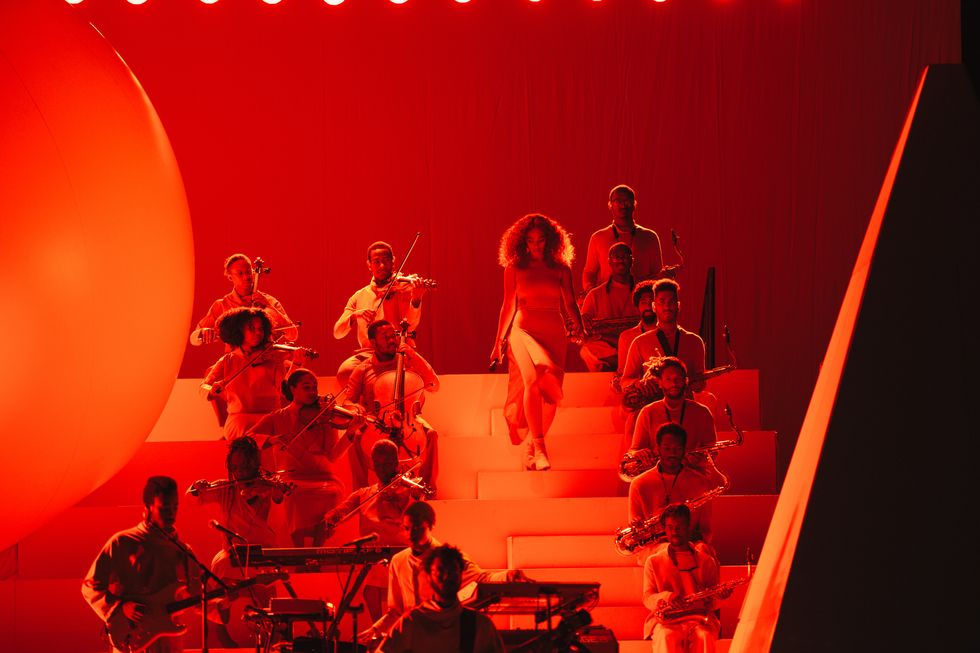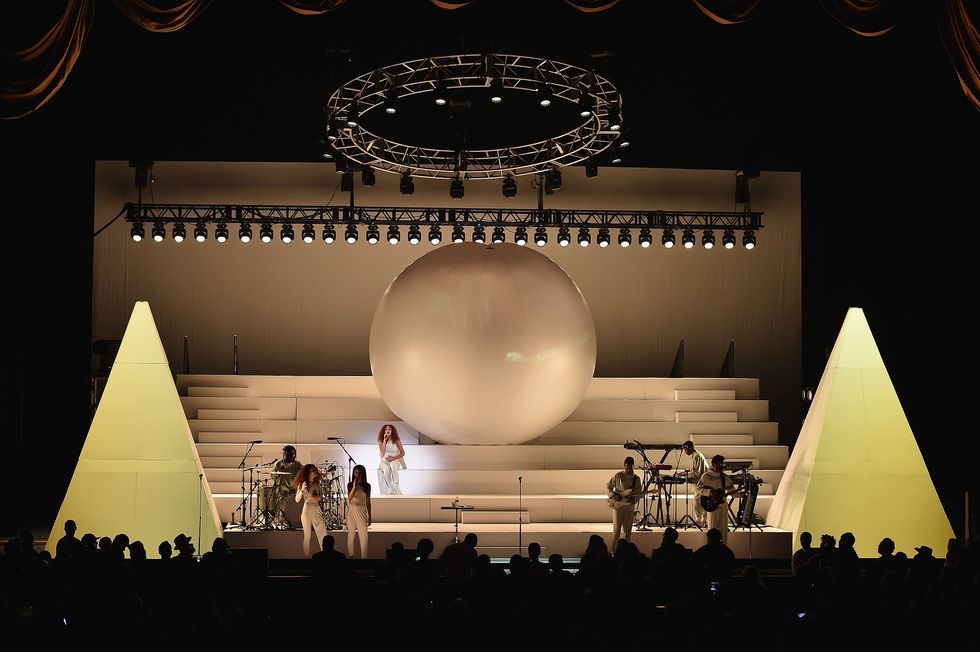I ran into a friend before Solange Knowles' show at New York City's Radio City on Tuesday night. "I'm ready to be cleansed," she said. I knew what she meant. The buzz at the historic venue was muted—perhaps reflecting the tragedies and trauma that have dominated the news over the past year, or even the past week—but it was definitely there.
A year ago, Knowles released A Seat at the Table; the album debuted at #1 on the Billboard chart, the artist's first reign by that metric. While the songs on the record were written over a period of years, when it came out, the album's potent interrogation of the past, of the self, and of the present felt like both a tonic and a pressure valve for a country in the grip of a racial crisis finally being noticed in the mainstream. "I knew that I needed to create this album to get rid and work through the anguish and the grief that I was constantly digesting," Knowles offered, in an interview for her Saint Heron website. "Then, the ugly backdrop of the state of America constantly reconfirmed that." Songs like "Weary" and "Mad" protested the constant struggle faced by the black community in a society inimical to its rights and survival, and others, like "Rise," celebrated its members thriving despite all this. ASATT provided a mirror for those feeling unseen and unheard elsewhere.
One year on—a new president at the helm; racism flaring daily, ever more public and unabashed—ASATT hasn't lost any of its needling, soothing authority. It's in this fraught context that Knowles has returned to the stage for the Orion's Rise tour and, if anything, its songs have become even more anthemic, gradually accruing power and relevance.
Against a striking white geometric backdrop and staircase, lit intermittently with James Turrell–esque washes of red and blue, Knowles emerged, clad like a muse or a queen in a clinging one-shouldered cutout tunic. "Weary," which opened the set, struck our tired hearts like a drum: "I'm weary of the ways of the world," she sang, reckoning anew with life's trials. But you could never mistake this for a defeatist cri de coeur. "I'm gonna look for my glory, yeah / I'll be back like real soon," she continued; it's Knowles' way to acknowledge trouble and move onwards, upwards.
Knowles has crafted herself a cultural position that is one part bard, one part healer. Having written this extraordinary music out of her own strife, she provided a way for us to deal with ours. In "Mad," she pushes back against the idea that if you're furious you should stay quiet: "You got a right to be mad / But when you carry it alone you find it only getting in the way." The flavor of Knowles' wisdom is to meet us exactly where we are and tell the simple truth of what she sees. But she herself has been on that journey, as she said on stage: "This started as a project that I had to do for my sanity...when I started on the album, I still had so much pain."
Naming the wound, she then provides the cure: joy. "Cranes in the Sky," such a banger that there's a meme about it, is a unique creation. Its beat was one of 2016's best, and on Tuesday night it brought us out of our velvet seats, on our feet to celebrate its beauty and contagious expansiveness. You'd never think that the lyrics tell a sadder tale—of countless failed attempts to exorcise pain—but such is the particular alchemy of ASATT: It's a survivor's account that doesn't totally exclude the darkness it overcame.
Knowles' gift for joy shone at Radio City all evening: hitting a high note, whipping her body around in untempered dances, directing her limbs skyward as if in a sun-salute. And she wanted us to come along with her. "We're gonna do some dancing tonight," she declared. While her physical exuberance undeniably conveyed her pleasure in performing and being there in the room with us, her voice was an even purer expression of that joy. It transcended even the delicate strength it held on the album, seemingly defying the laws of physics with its sweetness and flexibility.
Towards the end of the show, Knowles thanked the crowd: "You guys have allowed me the space to evolve and to grow and experiment and explore." She highlighted one of the most extraordinary aspects of this exploration in "F.U.B.U.," which claims the space for herself and other black artists to make art explicitly for black audiences. Finally, after a short break, she returned to the stage in a beautifully voluminous red dress shaped like a crinoline, to perform the defiant "Don't Touch My Hair," a song which is the ultimate statement of sovereignty over the self. "But this here is mine," she sang as the crowd rose to their feet once more. The journey of making ASATT was Knowles', as is the music that resulted. But her generosity has allowed us to draw strength from it, too.















